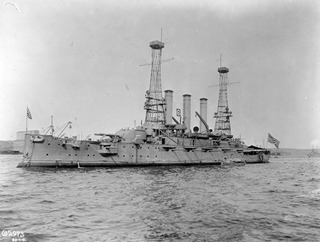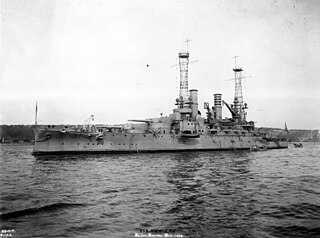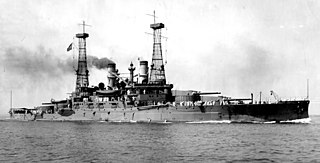
USS Louisiana (BB-19) was a Connecticut-class battleship of the United States Navy. She was the second member of the class of six pre-dreadnought battleships, and the third ship to carry her name. Louisiana was laid down in February 1903, launched in August 1904, and commissioned in June 1906. She was a 16,000-long-ton (16,000 t) battleship capable of 19 knots. Her main armament consisted of four 12-inch (305 mm) guns supported by a mixed secondary battery of 7 in (178 mm) and 8 in (203 mm) guns.

USS Alabama (BB-8) was an Illinois-class pre-dreadnought battleship built for the United States Navy. She was the second ship of her class, and the second to carry her name. Her keel was laid down in December 1896 at the William Cramp & Sons shipyard, and she was launched in May 1898. She was commissioned into the fleet in October 1900. The ship was armed with a main battery of four 13-inch (330 mm) guns and she had a top speed of 16 knots.

USS Nebraska (BB-14) was a Virginia-class pre-dreadnought battleship of the United States Navy, the second of five members of the class, and the first ship to carry her name. She was built by the Moran Brothers shipyard in Seattle, Washington, with her keel laying in July 1902 and her launching in October 1904. The completed ship was commissioned into the US Navy in July 1907. The ship was armed with an offensive battery of four 12-inch (305 mm) guns and eight 8-inch (203 mm) guns, and she was capable of a top speed of 19 knots.

New Hampshire (BB-25) was the sixth and final Connecticut-class pre-dreadnought battleship, the last vessel of that type built for the United States Navy. Like most contemporary battleships, she was armed with an offensive armament that consisted of four large-caliber 12-inch (305 mm) guns and several medium-caliber 7 and 8-inch guns. The ship was laid down in May 1905, launched in June 1906, and commissioned in March 1908, a little over a year after the revolutionary all-big-gun HMS Dreadnought rendered ships like New Hampshire obsolescent.

USS Maine (BB-10), the lead ship of her class of pre-dreadnought battleships, was the second ship of the United States Navy to be named in honor of the 23rd state. Maine was laid down in February 1899 at the William Cramp & Sons shipyard in Philadelphia. She was launched in July 1901 and commissioned into the fleet in December 1902. She was armed with a main battery of four 12-inch (305 mm) guns and could steam at a top speed of 18 knots.

USS New Jersey (BB-16) was the fourth of five Virginia-class battleships of the United States Navy, and the first ship to carry her name. She was laid down at the Fore River Shipbuilding Company in Quincy, Massachusetts, in May 1902, launched in November 1904, and commissioned into the fleet in May 1906. The ship was armed with an offensive battery of four 12-inch (305 mm) guns and eight 8-inch (203 mm) guns, and she was capable of a top speed of 19 knots.

USS Virginia (BB-13) was a United States Navy pre-dreadnought battleship, the lead ship of her class. She was the fifth ship to carry her name. Virginia was laid down in May 1902 at the Newport News Shipbuilding and Dry Dock Company in Newport News, Virginia, was launched in April 1904, and was commissioned into the fleet in May 1906. The ship was armed with an offensive battery of four 12-inch (305 mm) guns and eight 8-inch (203 mm) guns, and she was capable of a top speed of 19 knots.

USS Ohio (BB-12), a Maine-class pre-dreadnought battleship, was the third ship of her class and the third ship of the United States Navy to be named for the 17th state. She was laid down at the Union Iron Works shipyard in San Francisco in April 1899, was launched in May 1901, and was commissioned into the fleet in October 1904. She was armed with a main battery of four 12-inch (305 mm) guns and could steam at a top speed of 18 knots.

USS Illinois (BB-7) was a pre-dreadnought battleship built for the United States Navy. She was the lead ship of the Illinois class, and was the second ship of the U.S. Navy to be named for the 21st state. Her keel was laid down in February 1897 at the Newport News Shipbuilding & Dry Dock Company, and she was launched in October 1898. She was commissioned in September 1901. The ship was armed with a main battery of four 13-inch (330 mm) guns and she had a top speed of 16 knots.

USS Rhode Island (BB-17) was the last of five Virginia-class battleships built for the United States Navy, and was the second ship to carry her name. She was laid down in May 1902, launched in May 1904, and commissioned into the Atlantic Fleet in February 1906. The ship was armed with an offensive battery of four 12-inch (305 mm) guns and eight 8-inch (203 mm) guns, and she was capable of a top speed of 19 knots.

USS Wisconsin (BB-9), an Illinois-class pre-dreadnought battleship, was the first ship of the United States Navy to be named for the 30th state. She was the third and final member of her class to be built. Her keel was laid down in February 1897 at the Union Iron Works in San Francisco, and she was launched in November 1898. The completed ship was commissioned into the fleet in February 1901. The ship was armed with a main battery of four 13-inch (330 mm) guns and she had a top speed of 16 knots.

USS Connecticut (BB-18), the fourth United States Navy ship to be named after the state of Connecticut, was the lead ship of her class of six pre-dreadnought battleships. Her keel was laid on 10 March 1903; launched on 29 September 1904, Connecticut was commissioned on 29 September 1906, as the most advanced ship in the US Navy.

USS Minnesota (BB-22), the fifth of six Connecticut-class pre-dreadnought battleships, was the first ship of the United States Navy in honor of the 32nd state. She was laid down at the Newport News Shipbuilding Company of Newport News, Virginia in October 1903, launched in April 1905, and commissioned into the US fleet in March 1907, just four months after the revolutionary British battleship HMS Dreadnought entered service. Minnesota was armed with a main battery of four 12-inch (305 mm) guns and a secondary battery of twenty 7 and 8 in guns, unlike Dreadnought, which carried an all-big-gun armament that rendered ships like Minnesota obsolescent.

USS Missouri (BB-11), a Maine-class battleship, was the second ship of her class and of the United States Navy to be named in honor of the 24th state. Missouri was laid down in February 1900 at the Newport News Shipbuilding & Drydock Company, was launched in December 1901, and was commissioned into the fleet in December 1903. She was armed with a main battery of four 12-inch (305 mm) guns and could steam at a top speed of 18 knots.

USS Michigan (BB-27), a South Carolina-class battleship, was the second ship of the United States Navy to be named in honor of the 26th state. She was the second member of her class, the first dreadnought battleships built for the US Navy. She was laid down in December 1906, launched in May 1908, and commissioned into the fleet 4 January 1910. Michigan and South Carolina were armed with a main battery of eight 12-inch (305 mm) guns in superfiring twin gun turrets; they were the first dreadnoughts to feature this arrangement.

USS Georgia (BB-15) was a United States Navy Virginia-class battleship, the third of five ships of the class. She was built by the Bath Iron Works in Maine, with her keel laid in August 1901 and her launching in October 1904. The completed battleship was commissioned into the fleet in September 1906. The ship was armed with an offensive battery of four 12-inch (305 mm) guns and eight 8-inch (203 mm) guns, and she was capable of a top speed of 19 knots.

USS South Carolina (BB-26), the lead ship of her class of dreadnought battleships, was the fourth ship of the United States Navy to be named in honor of the eighth state. She was also the first American dreadnought; though she did not incorporate turbine propulsion like HMS Dreadnought, South Carolina's design included revolutionary aspects as well, primarily the superfiring arrangement of her main battery. The ship was laid down in December 1906 and launched in July 1908 before being commissioned into the US Atlantic Fleet in March 1910.

USS Vermont (BB-20), a Connecticut-class battleship, was the second ship of the United States Navy named after the 14th state. She was the third member of the class, which included five other ships. The Connecticut-class ships were armed with a main battery of four 12-inch (305 mm) guns and had a top speed of 19 knots. Vermont was laid down in May 1904 at the Fore River shipyard and launched in August 1905. The ship entered service with the Atlantic Fleet in March 1907.

USS Wyoming (BB-32) was the lead ship of her class of dreadnought battleships and was the third ship of the United States Navy named Wyoming, although she was only the second named in honor of the 44th state. Wyoming was laid down at the William Cramp & Sons in Philadelphia in February 1910, was launched in May 1911, and was completed in September 1912. She was armed with a main battery of twelve 12-inch (305 mm) guns and capable of a top speed of 20.5 kn.

USS Arkansas (BB-33) was a dreadnought battleship, the second member of the Wyoming class, built by the United States Navy. She was the third ship of the US Navy named in honor of the 25th state, and was built by the New York Shipbuilding Corporation. She was laid down in January 1910, launched in January 1911, and commissioned into the Navy in September 1912. Arkansas was armed with a main battery of twelve 12-inch (305 mm) guns and capable of a top speed of 20.5 knots.
























